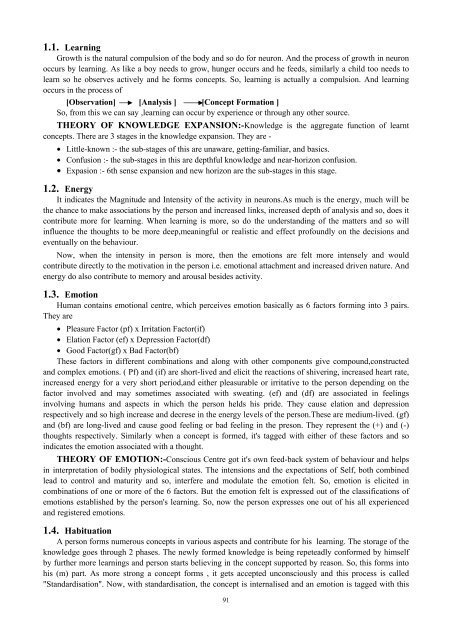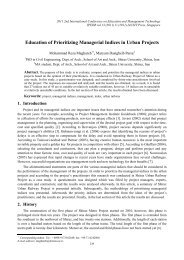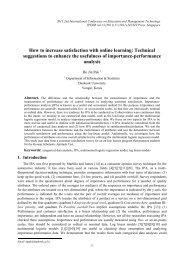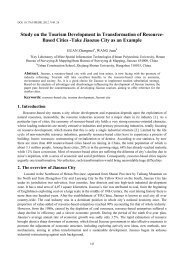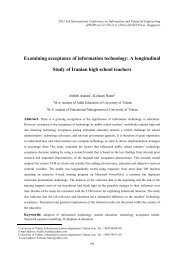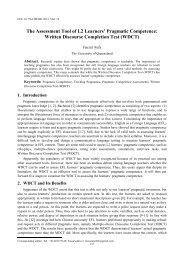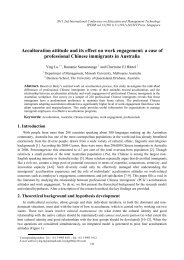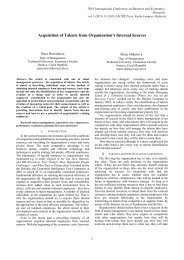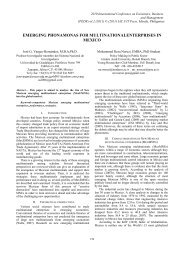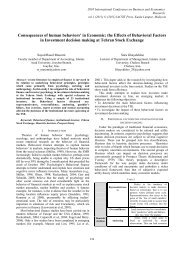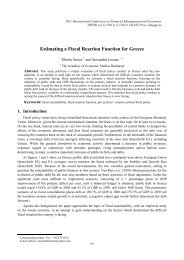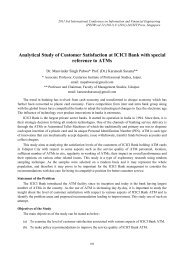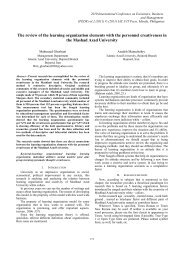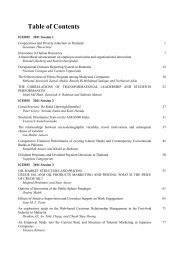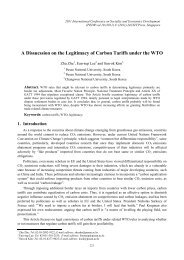Model of Personality: Elements of Psychology - ipedr
Model of Personality: Elements of Psychology - ipedr
Model of Personality: Elements of Psychology - ipedr
You also want an ePaper? Increase the reach of your titles
YUMPU automatically turns print PDFs into web optimized ePapers that Google loves.
1.1. Learning<br />
Growth is the natural compulsion <strong>of</strong> the body and so do for neuron. And the process <strong>of</strong> growth in neuron<br />
occurs by learning. As like a boy needs to grow, hunger occurs and he feeds, similarly a child too needs to<br />
learn so he observes actively and he forms concepts. So, learning is actually a compulsion. And learning<br />
occurs in the process <strong>of</strong><br />
[Observation] [Analysis ] [Concept Formation ]<br />
So, from this we can say ,learning can occur by experience or through any other source.<br />
THEORY OF KNOWLEDGE EXPANSION:-Knowledge is the aggregate function <strong>of</strong> learnt<br />
concepts. There are 3 stages in the knowledge expansion. They are -<br />
• Little-known :- the sub-stages <strong>of</strong> this are unaware, getting-familiar, and basics.<br />
• Confusion :- the sub-stages in this are depthful knowledge and near-horizon confusion.<br />
• Expasion :- 6th sense expansion and new horizon are the sub-stages in this stage.<br />
1.2. Energy<br />
It indicates the Magnitude and Intensity <strong>of</strong> the activity in neurons.As much is the energy, much will be<br />
the chance to make associations by the person and increased links, increased depth <strong>of</strong> analysis and so, does it<br />
contribute more for learning. When learning is more, so do the understanding <strong>of</strong> the matters and so will<br />
influence the thoughts to be more deep,meaningful or realistic and effect pr<strong>of</strong>oundly on the decisions and<br />
eventually on the behaviour.<br />
Now, when the intensity in person is more, then the emotions are felt more intensely and would<br />
contribute directly to the motivation in the person i.e. emotional attachment and increased driven nature. And<br />
energy do also contribute to memory and arousal besides activity.<br />
1.3. Emotion<br />
Human contains emotional centre, which perceives emotion basically as 6 factors forming into 3 pairs.<br />
They are<br />
• Pleasure Factor (pf) x Irritation Factor(if)<br />
• Elation Factor (ef) x Depression Factor(df)<br />
• Good Factor(gf) x Bad Factor(bf)<br />
These factors in different combinations and along with other components give compound,constructed<br />
and complex emotions. ( Pf) and (if) are short-lived and elicit the reactions <strong>of</strong> shivering, increased heart rate,<br />
increased energy for a very short period,and either pleasurable or irritative to the person depending on the<br />
factor involved and may sometimes associated with sweating. (ef) and (df) are associated in feelings<br />
involving humans and aspects in which the person helds his pride. They cause elation and depression<br />
respectively and so high increase and decrese in the energy levels <strong>of</strong> the person.These are medium-lived. (gf)<br />
and (bf) are long-lived and cause good feeling or bad feeling in the preson. They represent the (+) and (-)<br />
thoughts respectively. Similarly when a concept is formed, it's tagged with either <strong>of</strong> these factors and so<br />
indicates the emotion associated with a thought.<br />
THEORY OF EMOTION:-Conscious Centre got it's own feed-back system <strong>of</strong> behaviour and helps<br />
in interpretation <strong>of</strong> bodily physiological states. The intensions and the expectations <strong>of</strong> Self, both combined<br />
lead to control and maturity and so, interfere and modulate the emotion felt. So, emotion is elicited in<br />
combinations <strong>of</strong> one or more <strong>of</strong> the 6 factors. But the emotion felt is expressed out <strong>of</strong> the classifications <strong>of</strong><br />
emotions established by the person's learning. So, now the person expresses one out <strong>of</strong> his all experienced<br />
and registered emotions.<br />
1.4. Habituation<br />
A person forms numerous concepts in various aspects and contribute for his learning. The storage <strong>of</strong> the<br />
knowledge goes through 2 phases. The newly formed knowledge is being repeteadly conformed by himself<br />
by further more learnings and person starts believing in the concept supported by reason. So, this forms into<br />
his (m) part. As more strong a concept forms , it gets accepted unconsciously and this process is called<br />
"Standardisation". Now, with standardisation, the concept is internalised and an emotion is tagged with this<br />
91


